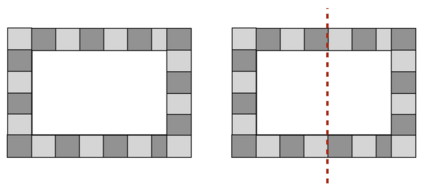We study piece-wise constant signals corrupted by additive Gaussian noise over a $d$-dimensional lattice. Data of this form naturally arise in a host of applications, and the tasks of signal detection or testing, de-noising and estimation have been studied extensively in the statistical and signal processing literature. In this paper we consider instead the problem of partition recovery, i.e.~of estimating the partition of the lattice induced by the constancy regions of the unknown signal, using the computationally-efficient dyadic classification and regression tree (DCART) methodology proposed by \citep{donoho1997cart}. We prove that, under appropriate regularity conditions on the shape of the partition elements, a DCART-based procedure consistently estimates the underlying partition at a rate of order $\sigma^2 k^* \log (N)/\kappa^2$, where $k^*$ is the minimal number of rectangular sub-graphs obtained using recursive dyadic partitions supporting the signal partition, $\sigma^2$ is the noise variance, $\kappa$ is the minimal magnitude of the signal difference among contiguous elements of the partition and $N$ is the size of the lattice. Furthermore, under stronger assumptions, our method attains a sharper estimation error of order $\sigma^2\log(N)/\kappa^2$, independent of $k^*$, which we show to be minimax rate optimal. Our theoretical guarantees further extend to the partition estimator based on the optimal regression tree estimator (ORT) of \cite{chatterjee2019adaptive} and to the one obtained through an NP-hard exhaustive search method. We corroborate our theoretical findings and the effectiveness of DCART for partition recovery in simulations.
翻译:{我们研究的是因添加高斯的噪音而腐蚀成碎片的恒定信号。这种形式的数据自然出现在一系列应用中,并且在统计和信号处理文献中广泛研究了信号检测或测试、去除和估算等任务。在本文件中,我们考虑的是分区恢复的问题,即使用计算高效的 dyadic 分类和回归树(DCART) 的方法来估计由未知信号的粘结区域引发的拉蒂的隔断。我们证明,在分配元素形状的适当常规条件下,基于 DCART 的程序持续地以顺序的速率来估计底部的隔断。 也就是说, $k ⁇ 2 用于估算未知信号的粘结区域, 使用支持信号隔断的回缩 dyadic 分类(DCART) 方法, $\ sligad=2$ 。 美元 美元 美元 美元, 美元 美元 美元 美元 美元 美元 美元 基底部计算法的底部分配 。






